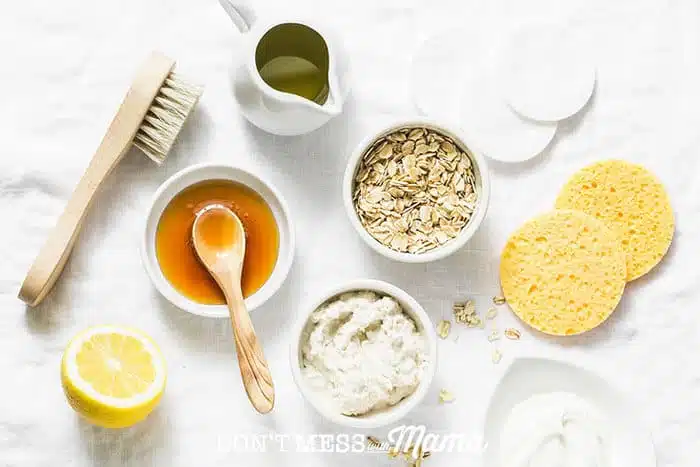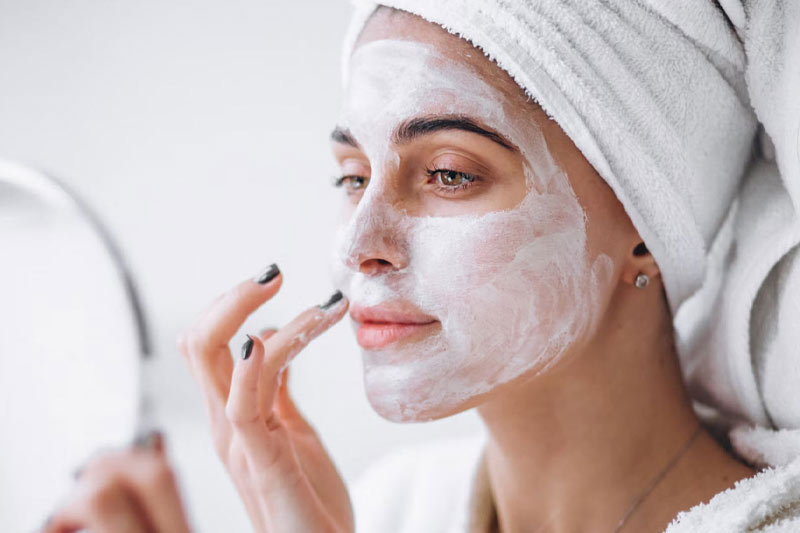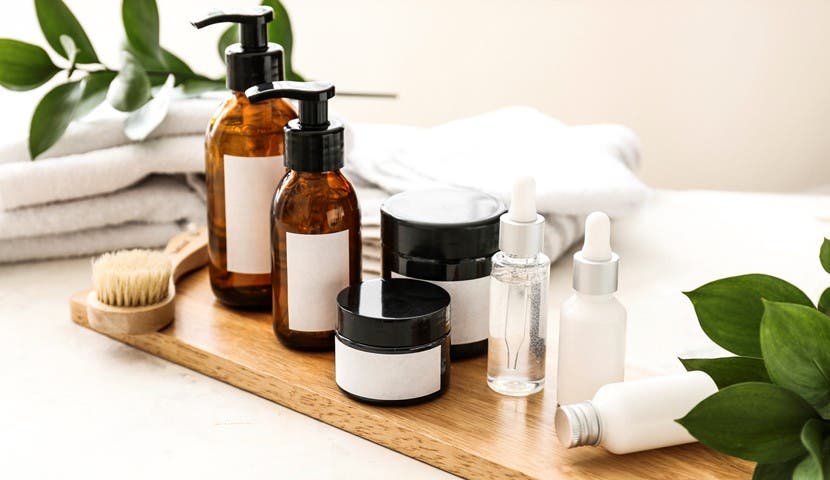
Blog
How to Build a Simple Organic Skincare Routine at Home

Creating a glowing, healthy complexion doesn’t require expensive products or harsh chemicals — sometimes, the best skincare comes straight from nature. Building a simple organic skincare routine at home allows you to nourish your melanin-rich skin using natural, chemical-free ingredients that restore balance and radiance.
South Africa’s climate, with its mix of dry air and strong sun, often leaves African skin feeling dehydrated or uneven in tone. By using natural ingredients like shea butter, aloe vera, honey, and coconut oil, you can cleanse, hydrate, and protect your skin naturally.
An organic routine focuses on gentle care, consistency, and moisture — keeping your skin barrier strong, your tone even, and your glow unmistakably radiant without relying on synthetic skincare products.
Understanding Organic Skincare
Organic skincare is all about using natural, plant-based ingredients that nourish the skin without synthetic chemicals or artificial preservatives.
Unlike commercial products that often contain parabens, sulfates, and artificial fragrances, organic skincare relies on ingredients such as aloe vera, shea butter, honey, and coconut oil to hydrate, soothe, and protect the skin. These natural elements are rich in vitamins, minerals, and antioxidants that support the skin barrier and promote long-term health.
For African skin, which is prone to dryness, hyperpigmentation, and sensitivity, organic skincare offers gentle yet powerful solutions that work in harmony with the skin’s natural oils. It’s not just a beauty trend — it’s a holistic approach to skincare that celebrates purity, sustainability, and balance while helping your skin glow naturally.
Essential Ingredients for an Organic Routine

Building an effective natural skincare routine starts with choosing ingredients that nourish, protect, and balance your skin without harsh chemicals.
Here are key components to include in your natural skin care routine:
1. Aloe Vera
A soothing plant extract that hydrates deeply, calms irritation, and supports the skin’s natural barrier — ideal for sensitive skin and acne-prone skin.
2. Honey
A natural humectant that locks in moisture, gently exfoliates, and helps fight bacteria. Perfect for dry or oily skin needing hydration and balance.
3. Coconut Oil
Rich in fatty acids, coconut oil softens, nourishes, and heals. It’s excellent for dry skin but should be used sparingly on acne-prone skin to avoid clogging pores.
4. Jojoba Oil
A lightweight oil that mimics the skin’s sebum, jojoba oil balances oil production, making it perfect for both oily skin and sensitive skin types.
5. Shea Butter
This natural moisturizer restores elasticity and smoothness, especially beneficial in any natural skin care regimen for dry or irritated skin.
6. Green Tea Extract
Loaded with antioxidants, it protects against free radicals, soothes inflammation, and supports clearer skin — ideal for acne-prone skin.
7. Oatmeal
Gently exfoliates and soothes sensitive skin, helping maintain hydration and calm redness.
8. Essential Oils (Lavender, Tea Tree, Chamomile)
These natural oils offer antibacterial, anti-inflammatory, and calming effects — valuable in any balanced natural skincare routine for all skin types.
Incorporating these ingredients regularly ensures glowing, nourished, and healthy skin naturally.
Step-by-Step Organic Skincare Routine

Creating a simple organic skincare routine at home is one of the best ways to care for African skin naturally. With South Africa’s diverse climate — from humid coastlines to dry inland regions — melanin-rich skin often faces unique challenges like dryness, uneven tone, and sensitivity.
A consistent, natural routine nourishes, hydrates, and protects the skin barrier, keeping it radiant, smooth, and healthy without relying on synthetic ingredients. Here’s how to build your own organic skincare routine, step by step.
Step 1: Cleanse – Gently Remove Dirt and Impurities
The foundation of every effective skincare routine is cleansing. For organic skincare, choose natural cleansers that remove dirt, excess oil, and pollutants without stripping your skin’s natural moisture.
What to use:
- Aloe vera gel – Hydrates while cleansing, ideal for dry or sensitive skin.
- Raw honey – Naturally antibacterial and soothing, perfect for acne-prone skin.
- Oats or milk – Gently exfoliate while cleansing, improving skin texture.
How to use:
Massage your chosen cleanser gently into damp skin using circular motions. Rinse with lukewarm water and pat dry with a soft towel. Avoid hot water, which can dry out the skin barrier.
Step 2: Exfoliate – Buff Away Dead Skin Cells (2–3 Times a Week)
Exfoliation helps remove dead skin cells, unclog pores, and reveal smoother, brighter skin. Over-exfoliation, however, can irritate melanin-rich skin, so gentle natural scrubs are best.
What to use:
- Brown sugar and honey scrub – Hydrates while exfoliating.
- Ground coffee and coconut oil – Energizes the skin and improves circulation.
- Oatmeal and yogurt – Perfect for sensitive skin, balancing oil and soothing irritation.
How to use:
Apply your exfoliant to clean, damp skin and gently buff in small circles for one to two minutes. Rinse thoroughly with warm water. Limit exfoliation to twice a week for dry skin and three times a week for oily skin to avoid damaging the skin’s surface.
Step 3: Tone – Balance and Refresh the Skin
Toning is often overlooked, yet it’s a vital step for balancing pH levels and preparing the skin for deeper hydration.
What to use:
- Rose water – Refreshes and tones, great for all skin types.
- Witch hazel – Reduces oil and tightens pores (best for oily or combination skin).
- Rooibos tea – Packed with antioxidants to calm and protect dark skin tones.
How to use:
After cleansing, apply your toner with a cotton pad or spritz directly onto your face. Let it air dry — this preps your skin for better absorption of moisturizers and oils.
Step 4: Moisturize – Hydrate and Lock In Moisture
Moisturizing keeps your skin supple and prevents dryness and flakiness. This step is especially crucial for African women, as melanin-rich skin tends to lose water quickly.
What to use:
- Shea butter – Deeply hydrating and rich in vitamin A and E.
- Coconut oil – Penetrates deeply to soften rough skin.
- Aloe vera gel and baobab oil blend – Lightweight option for oily skin.
- Marula oil – Strengthens the skin barrier and improves elasticity.
How to use:
Warm a small amount of your moisturizer or oil blend in your hands and apply to slightly damp skin. For dry skin, layer shea butter over your oil for extra hydration. For oily skin, use lighter oils that absorb quickly without clogging pores.
Step 5: Protect – Daily Sun Protection
Even though dark skin tones have natural sun protection due to melanin, daily sunscreen is essential to prevent hyperpigmentation, dark spots, and premature aging.
What to use:
- Choose mineral-based sunscreens with zinc oxide or titanium dioxide, which are gentle and effective.
- Look for organic or reef-safe SPF options available in South Africa.
How to use:
Apply sunscreen every morning after moisturizing, even on cloudy days. Reapply every two hours if outdoors or exposed to direct sunlight.
Step 6: Nourish – Weekly Organic Face Masks
Adding a weekly face mask helps target specific concerns such as dullness, dryness, or breakouts.
What to use:
- Honey and lemon mask – Brightens and evens tone for dark skin.
- Aloe vera and turmeric mask – Calms inflammation and boosts glow.
- Avocado and olive oil mask – Deeply nourishes dry skin and restores moisture.
How to use:
Apply your mask evenly to clean skin, avoiding the eye area. Leave it on for 15–20 minutes, then rinse with cool water and pat dry.
Step 7: Night Care – Replenish While You Sleep
Nighttime is when your skin repairs itself, so this is the perfect opportunity to add richer hydration.
What to use:
- Shea butter or marula oil for overnight moisture retention.
- Aloe vera gel to calm and cool tired skin.
- A few drops of vitamin C oil to fade dark spots and improve tone.
How to use:
Apply a thin layer of your chosen product before bed. Sleep on a satin pillowcase to minimize friction and keep your skin smooth.
A step-by-step organic skincare routine doesn’t need to be complicated — just consistent and intentional. By using simple, locally available ingredients like shea butter, aloe vera, coconut oil, and honey, you can nourish melanin-rich skin naturally. Whether you have oily, dry, or sensitive skin, these steps help maintain hydration, strengthen the skin barrier, and promote a long-lasting, natural glow. Your healthiest skin begins with nature — pure, simple, and authentically African.
Customizing for Skin Type

Every person’s skin is unique, and understanding your skin type is essential to building an effective natural skincare routine. Customization ensures that the ingredients you use support your skin’s needs without disrupting its balance or damaging the healthy skin barrier.
1. Dry Skin
For dry skin, focus on deep hydration. Use natural skin care products rich in shea butter, aloe vera, and coconut oil to lock in moisture. Avoid harsh exfoliants and opt for mild ones like oatmeal or lactic acid to gently remove dead skin cells.
2. Oily Skin
If you have oily skin, balance is key. Lightweight oils like jojoba oil and grapeseed oil regulate sebum production. Clay masks and green tea toners help purify pores without stripping natural oils.
3. Sensitive Skin
Sensitive skin benefits from calming ingredients such as chamomile, rose water, and aloe vera. Avoid artificial fragrances and alcohol-based toners that can irritate the skin.
4. Combination Skin
Combination skin needs targeted care — lightweight hydration for the T-zone and richer creams for dry areas. Gentle exfoliation helps balance texture.
5. Acne-Prone Skin
For acne-prone types, focus on soothing inflammation and clearing clogged pores with natural skincare ingredients like tea tree oil, vitamin C, and honey. Regular, gentle care tailored to your type ensures balanced, glowing, and healthy-looking skin naturally.
The Benefits of an Organic Skincare Routine

Switching to an organic skincare routine is one of the most rewarding choices you can make for your skin health. It’s not just a beauty trend — it’s a holistic approach that nurtures your skin from within, supporting its natural functions while avoiding the synthetic chemicals found in many commercial products.
Organic skincare focuses on purity, balance, and sustainability, offering visible and long-term benefits for all skin types.
1. Gentle and Non-Toxic Ingredients
Organic products are free from parabens, sulfates, artificial fragrances, and preservatives that can irritate or damage the healthy skin barrier. Instead, they use plant-based ingredients like aloe vera, shea butter, and natural oils that nourish and heal. This makes them ideal for sensitive skin, as they cleanse and moisturize without triggering inflammation or dryness.
2. Enhanced Skin Health and Texture
Because organic ingredients are rich in vitamins, antioxidants, and essential fatty acids, they feed the skin with nutrients that improve skin texture and elasticity. Ingredients like vitamin C, jojoba oil, and green tea extract help brighten dull complexions, boost collagen, and protect against free radical damage. Over time, consistent use of natural skincare products results in smoother, healthier, and more radiant skin.
3. Supports the Skin’s Natural Balance
Unlike harsh chemical treatments, organic skincare works with the body’s natural rhythm. Ingredients such as raw honey, aloe vera, and lactic acid help maintain moisture levels, gently exfoliate dead skin, and strengthen the skin’s natural barrier. This promotes long-term balance — preventing both excessive oiliness and dry skin while reducing breakouts and irritation.
4. Environmentally Friendly and Sustainable
Organic skincare benefits not just your skin but also the planet. These products are made using eco-friendly farming and production methods, often packaged in recyclable or biodegradable materials. By choosing natural skin care products, you support brands that prioritize sustainability, cruelty-free testing, and fair trade sourcing.
5. Long-Term Results Without Harm
While chemical-based products may offer quick fixes, their long-term effects can include irritation, sensitivity, and barrier damage. An organic skincare routine offers gradual but lasting improvement — protecting and rejuvenating the skin over time.
Safety Tips and Storage

1. Use Clean Tools: Always use clean bowls, spoons, and jars when preparing natural skincare products to prevent bacterial growth.
2. Store in Glass Containers: Keep homemade products in dark glass jars or bottles to preserve freshness and protect from sunlight exposure.
3. Label Everything: Write the preparation date and ingredients on labels to track freshness and avoid confusion.
4. Refrigerate When Needed: Store items like masks, toners, or aloe-based blends in the refrigerator to extend shelf life and maintain potency.
5. Avoid Contamination: Use clean hands or spatulas when applying to prevent bacteria from entering jars.
6. Check for Changes: Discard any product that changes color, texture, or smell.
7. Short Shelf Life: Most organic formulations last 1–4 weeks, so make small batches to ensure safe, effective skincare use.
Choose Black African Organics for Your At-Home Organic Routine
Take the guesswork out of DIY skincare with Black African Organics — clean, locally made formulas crafted for melanin-rich skin and South African climates.
From aloe-based cleansers and vitamin-rich serums to shea, baobab, and marula moisturisers, every product is vegan, cruelty-free, sulphate- and paraben-free, and designed to hydrate deeply, calm sensitivity, and support an even tone without harsh chemicals.
Build your routine with science-backed, plant-powered essentials that protect the skin barrier, fade the look of dark spots, and lock in long-lasting moisture — so your glow comes naturally, day after day.
Black African Organics: pure, effective, and proudly South African.
FAQs
How can I start a simple organic skincare routine at home?
Begin with a gentle cleanser or the oil cleansing method using a natural carrier oil like jojoba or coconut oil. This helps remove impurities without harsh ingredients. Follow up with apple cider vinegar as a natural toner to balance your skin’s pH and combat skin issues like pretty intense adult acne. Apply hydrating hyaluronic acid to keep your skin soft and smoother, finishing with broad spectrum sunscreen to protect against sun damage and skin cancer.
What natural ingredients help with anti-aging and fine lines?
To maintain youthful skin, focus on ingredients that boost collagen production and enhance blood flow. Vitamin E, manuka honey, and glycolic acid promote collagen production and help reduce fine lines and acne scars. These ingredients’ antioxidant properties protect aging skin from chemical sunscreens and environmental stress, while eye creams rich in healing properties soothe delicate areas.
How can diet and lifestyle improve skin health naturally?
A healthy diet packed with antioxidants supports skin healthy functions. Foods rich in omega-3s, vitamins, and minerals can stimulate blood flow and promote youthful, smoother skin. Drink plenty of water, avoid harsh ingredients, and manage stress to minimize breakouts and specific skin concerns. Regular exercise also helps stimulate blood flow, enhancing the skin’s glow and overall texture.
How do I choose products for different skin concerns?
Since everyone’s skin is unique, tailor your routine to your specific skin concerns. For acne scars, use glycolic acid or vitamin E serums. For aging skin, select anti-aging oils and eye creams that boost collagen production. Avoid chemical sunscreens—opt for mineral-based broad spectrum sunscreen instead. Always patch test natural ingredients like apple cider vinegar or manuka honey to prevent irritation while keeping your skin healthy and radiant.
Conclusion
Building a simple organic skincare routine at home is about embracing nature’s purest ingredients and creating consistency that works for your skin. With everyday items like shea butter, aloe vera, coconut oil, and honey, you can deeply nourish, protect, and balance melanin-rich skin without relying on harsh chemicals.
The secret lies in gentle cleansing, regular moisturizing, and using natural products that support the skin barrier and enhance your skin’s glow. Whether you have dry, oily, or sensitive skin, organic skincare allows you to adapt to your needs naturally.
South Africa’s rich supply of native botanicals like baobab oil and rooibos makes caring for your skin both sustainable and affordable — proving that true beauty begins with simple, mindful, and natural care.












